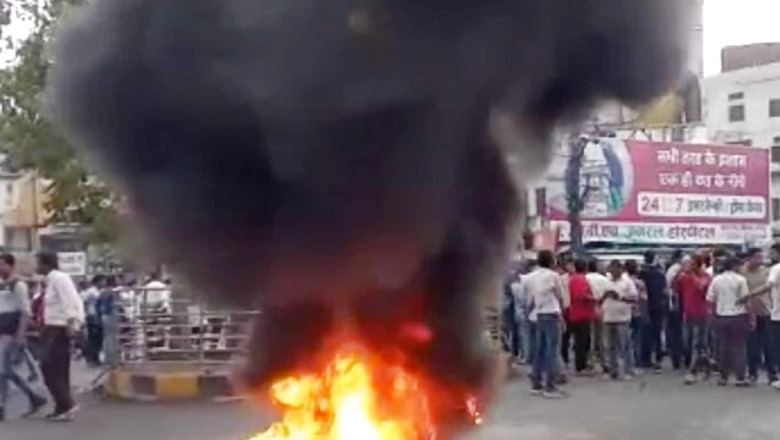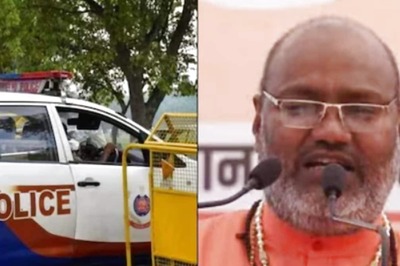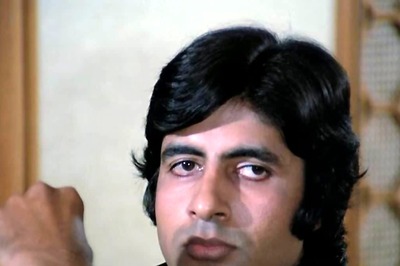
views
A gruesome murder in Udaipur has once again brought the Nupur Sharma issue to the limelight. A poor tailor who had dared to put up a WhatsApp status supporting Nupur was beheaded by terrorists, who made a video out of it to set an example. If reports are to be believed, the tailor’s own neighbours belonging to the offended community were keeping tabs on him, and passed information to the assailants when he reopened his shop after a few weeks.
As usual, the murder was followed by the same outrage, the same hypocrisy or whitewashing, and the same monkey-balancing that people have gotten used to from different quarters. Religious murders have become a part and parcel of public discourse to such an extent that even gruesome ones like the one in Udaipur do not stand out anymore. Most of us can draft a template social media post for religious murders and share it with the necessary customisations every week, and this would work for people from all sides of the ideological spectrum. A fatigue has set in, a sense of helplessness about what we are up against.
There is some truth to this helplessness. Winston Churchill, while referring to the two largest communities in India, had observed that while one of them elaborates its arguments, the other sharpens its sword. This is the underlying reality for those who feel helpless as they move from one bout of outrage to the next. They believe that their own community has swallowed the pills of Gandhian ahimsa, of the idea of India from the Nehruvian stable, and of economic growth being the ultimate panacea. Their own community’s agency therefore has eroded gradually. It is up against people who have yet to imbibe the refined illusions that cloud their own vision, ready to do whatever it takes to foist their religious beliefs and plant their flag in every nook and corner of India. Indeed, as incident after incident and the reactions to them demonstrate, values like non-violence, pluralism and individualism, supposedly enforced by the state in various ways, are in reality practiced in a very one-sided manner. Based on these assumptions, and on history in general, the sense of sitting on a ticking time-bomb has set in.
The state has not helped its case either, considering that at the most fundamental level, any social contract upon which the whole idea of the state is based entails the surrender of certain freedoms in exchange for protection. In fact, it is now an increasingly common belief that the state is ill-suited to handle what it is up against. The state’s role must be examined in detail, however, there is another side to the entire debate that has been missed out. Today, a large outpouring across the country happens for every such Hindu murder. Hindus have even taken to the streets for it, and the story dominates news cycles and public discourse because millions are aware and fuming. It can be argued that this eventually amounts to zilch. But in the past, entire exoduses from particular regions, and the complete and convenient erasure of even genocides and pogroms from our records, have generated less outrage than this. Perhaps this newfound awareness is only a fraction of the necessary awakening for the Hindus to change tact. The fact, however, is that it is manifold more than it used to be. Large sections of the Hindu community are refusing to let their helplessness turn into complacency.
Ultimately, how fast the Hindu community will change tact is difficult to predict. Even more difficult to predict is what changing tact will entail. This is where the state comes into the picture. In theory, the state possesses a monopoly on violence, and every erosion of this monopoly weakens it. Transgressions by one side have already weakened it considerably, especially since 2019 when the street veto has replaced the electoral veto that a large section exercised in the past. A free for all situation, wherein transgression is met by transgression, is the least desirable outcome of Hindu awakening from the state’s perspective.
If street veto is the substitute to the electoral veto that one of India’s two big communities enjoyed in the past, the obvious conclusion that one would draw is that recent political mandates and consequently the control of state power have gone into the hands of the other large community. However, the state’s repeated failures to crush street veto and communalism in other forms, seems to indicate that such an assessment is inaccurate. Political sloganeering might portray a different story, but ground realities indicate otherwise. The Udaipur beheading is a case in point. Calls to behead Nupur Sharma were made across the country, but the state adopted a lackadaisical approach. When violence broke out, the state cracked down retrospectively. The entire saga has played out for weeks, and has resulted in one beheading now.
Even more shocking is the state’s conduct at the local level when it comes to this case. Reports suggest that the man who was beheaded had informed the police that his life was in danger, indicating that the failure of law and order was much more acute than in the case of a spontaneous transgression. The argument that Rajasthan is an Opposition-ruled state can be made by the ruling party, but that would hold no water in the larger scheme of things because of incidents like Kamlesh Tiwari’s murder.
It is entirely possible that the Hindu community will never change tact. It also possible that in parallel, the state will keep bearing the brunt of the one-sided approach to things, and this suicidal combination will guide India until kingdom come. But what if this helplessness that refuses to die down strikes back? What if it strikes back only because the state remained complacent? It is impossible to accurately predict the factors and forces that will act up at different intervals. The state meanwhile needs to introspect honestly, not only about the possibilities that it is prepared for but what its objectives really are, irrespective of the outcomes that fate has in store.
Ajit Datta is an author and political commentator. He has authored the book, ‘Himanta Biswa Sarma: From Boy Wonder to CM’. The views expressed in this article are those of the author and do not represent the stand of this publication.
Read all the Latest News , Breaking News , watch Top Videos and Live TV here.



















Comments
0 comment